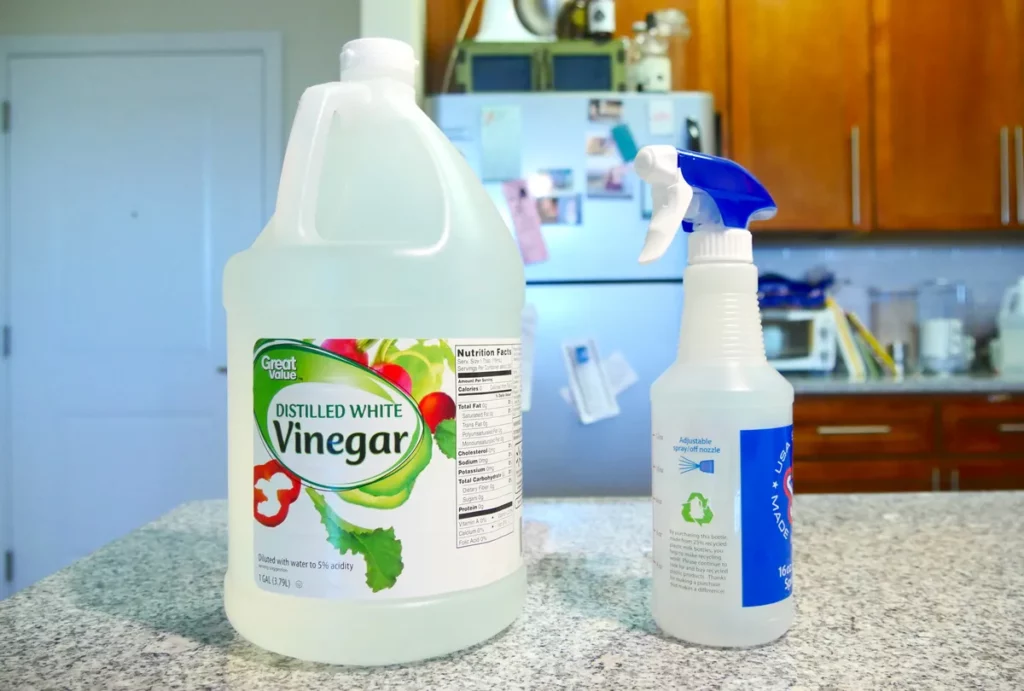Almost everyone has it in their home – vinegar. It cleans, fertilizes, and even keeps pests away from your plants. Here are six tips on how to use this household item as a garden helper.
Vinegar is not just for the kitchen or eco-friendly cleaning; it’s also a perfect household remedy for various tasks in your garden or on your balcony.
Here are six ways to use vinegar in the garden, along with some gardening methods to avoid.
Contents
Using Vinegar as Fertilizer
Some plants thrive in soil with higher acidity to display their full bloom, such as roses, lavender, and gardenias. If you want to support plant growth and add acidity to the soil, the best approach is to use a highly diluted vinegar-water mixture (1-2 tablespoons of vinegar in 3 liters of water).
But be cautious: This procedure should be carried out at most every three months. Otherwise, the soil risks becoming too acidic, which can harm your plants. To be certain, test the soil’s pH level before using vinegar, for instance, with a pH soil test kit from Neudorff.
Don’t forget to consider your neighboring plants when using vinegar. Not every nearby plant appreciates soil acidification. If you want to be on the safe side, only use vinegar as a fertilizer for standalone potted plants.
Encouraging Seed Germination
Some plants, like nasturtiums and okra, are known to be difficult to germinate. When seeds just won’t sprout, vinegar can be the solution. Seeds germinate more quickly if they’ve soaked overnight in a warm bath of diluted vinegar and water (mix apple cider vinegar with water at a ratio of 1:5). The vinegar bath promotes seed germination. Rinse the seeds the next day and plant them.
Cleaning Garden Tools and Planters
Before starting a new gardening season, plant containers, flower pots, and window boxes should be thoroughly cleaned in spring, or at the very least, before planting new flowers. You can remove lime deposits, algae, and winter dirt accumulated on them using a sponge and some vinegar.
This cleaning also eliminates mold and potential germs that could pose a problem for newly planted crops. Simply add some vinegar to the planters, scrub them thoroughly, and then rinse with clear water.
Vinegar is also an excellent choice for cleaning garden tools. This household item effectively fights rust and cleans dirty pruners and small shovels. If you prefer, you can soak the garden tools in a vinegar bath for a few minutes and then rinse with clear water. Not only do clean garden tools look brand new, but the risk of transferring fungi and pests from one plant to another via dirty tools is also reduced.
Prolonging the Freshness of Cut Flowers
If you want to enjoy the cut flowers from your garden for as long as possible, add a teaspoon of vinegar and a teaspoon of sugar to the water in your vase. Change the water and recut the flower stems every five days. This practice will keep the plants fresher for a longer period.
Repelling Pests with Vinegar
Commercial vinegar is a natural insecticide and very effective. Its strong smell keeps pests like aphids and fruit flies away from your lovingly tended plants, preventing them from infesting your garden. Simply spray the affected plants several times a day with a highly diluted water-vinegar mixture (1 teaspoon of household vinegar in 2 liters of water).
But be careful with the concentration; you don’t want to harm the plant with acetic acid. It’s best to test the vinegar mixture on a small part of the plant before spraying the entire plant.
Fighting Fungal Infections
Vinegar is also effective against fungal infections. Mix a tablespoon of vinegar with two liters of water, put it in a pressure sprayer, and spray your plants twice a week. This process can be repeated after a rainfall. Vinegar reduces the pH level, which inhibits the spread of fungal infections.
However, using vinegar to combat weeds is not recommended! Some gardeners think of vinegar as a secret weapon against weeds in their driveways and patios. While vinegar is an eco-friendly method for descaling and cleaning machines and surfaces in your home, it is by no means gentle or environmentally friendly when it comes to paved surfaces. Using vinegar for weed control is prohibited, as stated by the Lower Saxony Chamber of Agriculture, and can result in hefty fines.
If you want to use acetic acid to eliminate weeds, opt for a commercial herbicide based on acetic acid, available from specialist stores. These products are approved as plant protection agents and are formulated to ensure optimal effectiveness with minimal environmental impact.


